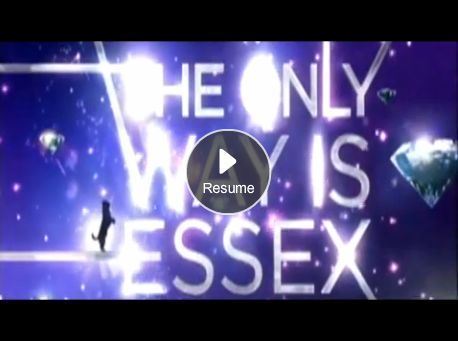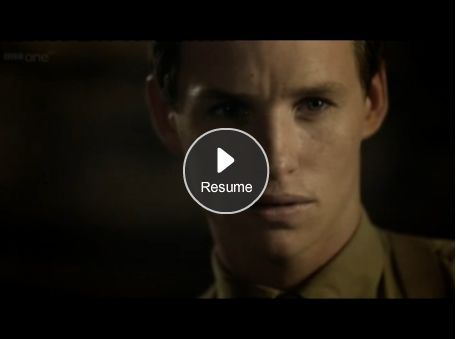Andrew Collins's Blog, page 42
February 16, 2012
Holding pattern
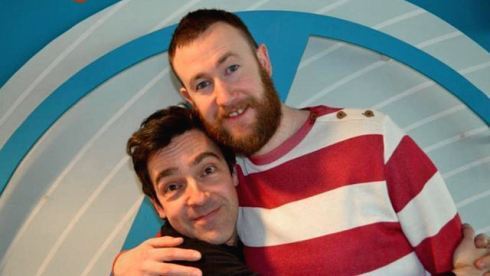
Hello, all. Another rolling apology for not tending to the blog garden as regularly as I should be. Not only am I up against the aforementioned Mr Blue Sky script delivery deadline, which looms ever closer each day (the first full cast read-through happens on March 5, on which day all six scripts will need to be in shape), but I'm doing 6 Music Breakfast all this week and next. It goes without saying that I enjoy both jobs, and could have said no to 6 Music, but I am determined to fit both in, and emerge triumphant and not as throaty and tired as I feel today. (I'm mainlining Vitamin C, and going to bed as early as 9pm, and not drinking, so I'm looking after myself.)
Breakfast is a blast. I like the photograph above of me hugging Alex Horne, and he hugging me back. I thought I'd publish it to raise a smile. Also, lest we forget, it means I am podcasting on a daily basis. The bite-sized best-of Breakfast Podcast is available all week right here. Yesterday's includes the Alex Horne interview, too. (He does too many things, as I do, many of them in the evening when I am nodding off in front of Friday Night Lights, and he has a young family. I don't know how he does it.)
I am also beholden to Radio Times to supply at least a weekly blog for their website, so, if you don't already, why not bookmark this page, and maybe have a glance at my most recent blogs about The Muppets, and J. Edgar. I've been managing to fit in numerous film screenings, so there's a massive backlog of reviews I've not had time to write: Martha Marcy May Marlene, A Dangerous Method, Extremely Loud & Incredibly Close, Girl Model, Carnage, the DVD of Harry Potter and The Deathly Hallows Pt 2, the list goes on.
Thank you for bearing with me. It's amazing that the blog still gets over 500 visitors a day, even when I don't post anything new. Normal service will be resumed. And there'll be another Telly Addict on Saturday. I don't remember when I was last this busy, but the self-employed do not complain about such things.








February 10, 2012
Normal service
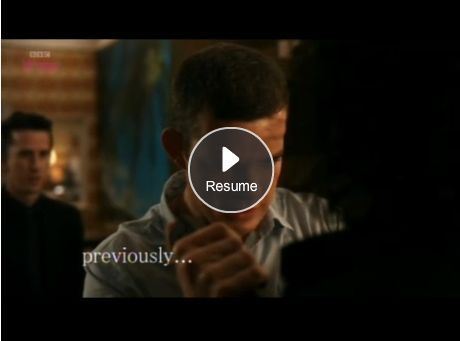
Eyes front! Normal service is resumed for this week's Telly Addict. The Guardian "digital first" department pulled itself together, fixed the Autocue, remembered to caption my clips and all was right with the world. (The weird thing is, only I seemed to notice that last week's was a bit "off". We apparently had a spike in views and drew more comments than normal, too, one or two of which weren't just, "You are shit, it is shit, everything you reviewed is shit." So go figure, as the Americans say.) This week, I'm covering the return of Being Human for its fourth series to BBC3, which I don't really think is aimed at me; the return of HBO's True Blood for its fourth season to FX, which I went off during season three but may well have fallen back in love with; and the return of Whitechapel for its third series to ITV1, which, again, I got fed up with during series two, but am well up for again now. (Note how carefully I refer to series if it's British, and seasons if it's American. One has to preserve the language.)
Next week, I plan on revisting Call The Midwife, which is the new sensation across the nation, as I tuned in to episode one and had to turn off as it had all these babies being born in it, and catching up with Inside Men, which might just be the best British thing on TV at the moment.








February 3, 2012
What are you looking at?
Oh dear. I thought we'd got away with it. But, no. A slight technical hitch at the Guardian yesterday: the Autocue, from which I seamlessly read my slaved-over Telly Addict script on a weekly basis, broke. Due to time pressure, we had no choice but to print my script out and gaffer tape the pages to a stand just underneath the camera, so that I could read it off. (If there had been time for me to learn each link and recite it, Collins & Maconie's Movie Club style, I would have happily and professionally done so, but there wasn't – look how long some of the links are!) This is why I am clearly LOOKING DOWN throughout, as if solely to make you feel a bit nauseous. I wouldn't blame you if you didn't watch it to the end, but the clips are good, so please stick with it if you can (or look away when I'm talking), and be assured that if the Autocue is not fixed next week, I'm doing a flounce. Digital is, after all, the bit of the Guardian that the Guardian is pinning all its future hopes on. Ah well. In between the disconcerting shots of me ignoring you, there are amusing bits of The Only Way Is Essex on ITV2; Spartacus: Vengeance on Sky1; and Noel Fielding's Luxury Comedy on E4. Normal service will be resumed next week, in time for reviews of Inside Men, True Blood and something else.








February 2, 2012
Eatiquette

I must apologise once again for the scarcity of 2012 blog entries. If I'm not here, or popping up in a rectangle on the Guardian Culture website telling you what I think of a telly programme, or reading out some light-hearted news items on Radio 2′s weekend breakfast show between 7-7.30am, or timewasting on Twitter, you can be pretty sure I'm sitting in a library or coffee shop typing.
The second series of Mr Blue Sky for Radio 4 moves on apace, as they say, and it has little choice, as the deadline for delivery of six brand new half-hour episodes is the end of February. Since you ask, I'm almost through the first draft of Episode 4, but that doesn't mean it's finished, as we stacked up many drafts of the four episodes in series one before they were camera-ready, or whatever the radio equivalent is. We're also having to re-cast one or two of the main parts due to that ol' devil called availability. (I can confirm that Mark Benton will return to play Mr Blue Sky himself, but other principals are in flux.)
Anyway, I'm relying on Twitter as a form of what we shall quaintly call "staying in touch." This morning, in need of a break from scriptwriting, I repaired to a Costa with my laptop (I still count it as a "screen break" if it involves a little walk), and threw out a hypothetical.
The response was mixed and interesting, so I thought I might throw it out again here, in a more formal fashion, and without the 140-character discipline. It is yet another question of etiquette and manners, which must be constantly updated and adjusted, so as to properly reflect the world around us, which changes constantly. When I was a teenager, I wore what we shall again quaintly call a "fisherman's cap" inside the parents' house of a girl I wished to woo, and it was only afterwards that I was informed of my social faux pas. Her Victorian parents were not impressed by my failure to remove the cap whilst under their roof, and I was oblivious.
It didn't matter in the long run, as the girl was not in the least bit interested in going out with me, but I remember feeling a bit guilty for doing the wrong thing. As it happens, my hat was pretty securely fixed to my head by way of backcombed and lacquered hair at front and back, but the 19th century parents were not to know that.
Anyway, mobile phones did not exist in the early 80s. Nor did portable computers. And nor did something called "tablet computers." Etiquette was more about hats and shoes, and taking them off when you went into houses. But things change, and these days, among many other things that annoy me as the author of the 2008 Manners Manifesto, it is increasingly the use, or misuse, or abuse, of phones that gets my goat. But this was new …
I was dining, with a co-diner, in a restaurant [not pictured] the other night. It was a local restaurant, and not "posh", but it was the evening, and it was a cut above nipping into Pizza Express with a voucher, put it that way. The lighting was low, and candles flickered sensually from each table. This was not a Costa in the afternoon. It was pretty full. Along one wall, tables for two were arranged side by side. This is where we were seated. A solo diner was seated beside us. This diner might have been waiting for somebody to join them, but they were solo on arrival. We, meanwhile, had ordered, and were waiting for the starter.
The solo diner took an iPad out of their bag. They turned it on and started fiddling with it, reading and scrolling and clicking in the usual touchpad manner. The combination of the tilt of the iPad, the diner's failure to adjust the brightness of the screen (which many on Twitter were quick to point out as a sensible option), the close proximity of the tables, and the low, some-might-say romantic lighting meant that the peripheral distraction caused by the lit-up 9.7-inch screen was more than noticeable, it was a problem.
I ask again: is this socially acceptable behaviour in the candlelit environment of a restaurant in the evening? The diner did not put the iPad away. They were not checking emails, they were using the iPad as a companion. Because the diner was alone, I felt some empathy. I have, in my professional life, dined alone on many occasions, and some of them in quite formal restaurants. As a music journalist, I was often sent off to other countries on my own (not always with a photographer or press chaperone), and as such grew accustomed to going into eating and drinking establishments on my own. I usually took a book, or a newspaper. Electronic versions thereof were not invented.
Had the adjacent diner pulled out a book, or paper, or indeed a Kindle, which emits hardly any vestigial light, I would have given them not another single thought. Indeed, I would have admired their independence. I actually think it's a heartwarming sight to see someone so self-assured and confident that they are willing to walk into a restaurant, order and eat a meal. Why should they care about what anybody thinks? Go for it.
But the iPad is a new addition to the social armoury. And I personally feel that there is a time and a place for whipping out a glowing tablet, and a restaurant at night, with people sitting either side, is not it.
But I'm always interested in what others have to say on the matter. As I say, I have sympathy with the solo diner, and respect for them, but occupying one's own space is paramount in mixed social situations. Flashing light around in the dark is just as much of an intrusion as talking loudly, or taking a call on a phone (which, if I owned a restaurant, I would ban outright). The glimpse of an illuminated screen in a cinema out of the corner of your eye is a major irritant. I have asked people with phones on to turn them off in cinemas, if I've felt that a knife would not come out. Just ask politely if the patron wouldn't mind turning off their screen, as it's distracting you from the film.
In a restaurant, it's not so clear cut.
You may remember me writing about my dismay in 2008 that a family eating out – this time in a brightly-lit, unromantic Pizza Express – allowed their tiny child to sit with headphones on and watch a cartoon on a portable DVD player. My blog entry wound up a lot of parents, who didn't see why their enjoyment of a pizza should be spoiled or their evening's plans inconvenienced just because they'd given birth to a baby. It can be a sensitive issue. I don't have kids. But I don't want to be a fascist about it. (By the way, I said nothing on the occasion of the headphoned baby. Didn't even sneer from a distance, or tut.)
You can re-live the Pizza baby debate here. But your thoughts on this latest conundrum would be welcomed.








January 28, 2012
Haunting
After a short delay due to planned engineering works, this week's Telly Addict review is now up, including reviews of three dramas: the "unmissable" Mad Dogs on Sky1; the "haunting" Birdsong on BBC1; and the "final series" of Hustle on BBC1. Does the grey shirt work?
Next week, I will be reviewing Noel Fielding's Luxury Comedy, The Only Way Is Essex and that Jean Shrimpton thing, I think, or maybe that Steven Mackintosh thing.








Do not adjust your set
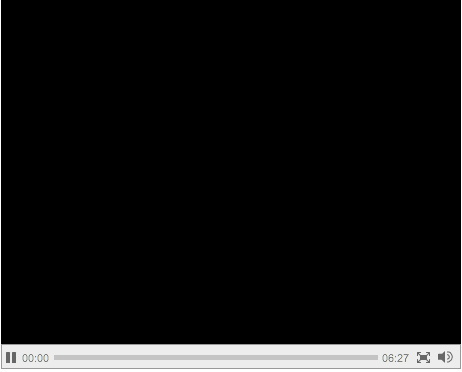
Hmm. This week's Telly Addict review has yet to appear in its usual place on the undercarriage of the Guardian website. People are looking into it. In the meantime, keep checking the link. It will includes reviews of three dramas: the "unmissable" Mad Dogs on Sky1; the "haunting" Birdsong on BBC1; and the "final series" of Hustle on BBC1. I seem to recall it was alright, but you only have my word for that presently.
Next week, I will be reviewing Noel Fielding's Luxury Comedy, The Only Way Is Essex and that Jean Shrimpton thing, I think. But let's see this week's first. Right, the Guardian?








January 27, 2012
My little phoney
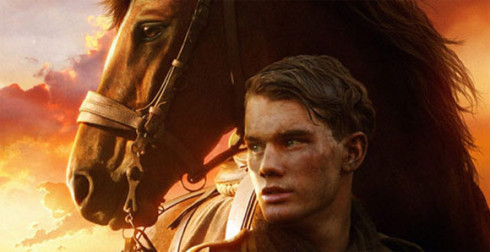
Belatedly caught War Horse yesterday afternoon. (It seemed like it would suit the matinee mood, and it did.) I had been forewarned by enough critics I respect that this was not Spielberg's finest hour, and that after the clever horse's-eye-view of the book, and the clever puppetry of the stage play, this was a pretty conventional telling of the tale, so I went in with low expectations. My expectations were met.
I have nothing against Steven Spielberg. It would be churlish to deny him the crown of the-modern-day's-Howard-Hawks (a big compliment from where I'm sitting), but he doesn't always knock it out of the park. How could he? But having made two strong, serious films about World War II, I'd hoped for something a bit more meaningful and original from him about World War I. Instead, outside of a couple of good, David Lean-exhuming set pieces, War Horse felt like a string of sometimes excruciating clichés and mechnical story beats. It reminded me more of Lassie Come Home, or, for a more contemporary but no less helpful comparison, Babe, than it did Saving Private Ryan. As has been pointed out already, the establishing act, set in rural Devon, was about as authentic-seeming as The Darling Buds Of May. Since Spielberg went to all the trouble of shooting it in Devon (and a bit of Wiltshire), this is a pretty unfortunate outcome.
A mostly English cast worked wonders with the Devon accent, but set, as they were, within a totally unreal, backlot vision of country life, even the august likes of David Thewlis and Emily Watson sounded hokey. It's not giving anything away to say that the action returns to Devon at the end, but when it does, Spielberg opts to paint the sky a golden/queasy yellow, as if perhaps Michael Bay had sat in for him that day, and everything looks post-apocalyptic, rather than Gone With The Wind glorious. This heavy-handed approach is fairly typical of the whole film. Nothing is allowed to go past without being sugar-coated or drained of blood.
Based of course on a children's book, this is a "family film" about one boy and his horse who must both go off to war without losing their 12A certificate, and as such, even the horrors of the barbed wire and the trenches and the mustard gas feel sanitised for afternoon consumption. (At one stage, the sail of a windmill in the foreground helpfully goes past to discreetly mask an act of violence in the background. Technical masterstroke, or cheap sleight of hand?) It's hard to convey the obscenity of a conflict that killed nine million people without showing bodyparts in massive piles, but co-writer Richard Curtis managed to do it on a BBC Comedy budget 20 years ago, which is ironic.
Novelist Michael Morpurgo's was such an interesting dramatic approach to the conflict, too; because the Great War marked the cusp of fully mechanised combat, the one million conscripted horses sent over to France from England represented the end of an era. It's truly bizarre to see the first cavalry charge, on horseback, with swords outstretched, the beasts eventually cut down by German machine guns. This is one of the film's successful set-pieces. Not only is it technically brilliant, it has something profound to say, and its outcome is unexpected. Spielberg pulls back from the massacre and, in long shot, shows us a field full of dead horses. This is not to suggest that Spielberg does not care about the human dead, as one rather extreme review put it, rather that he is adapting a book and play that put a new focus on the animals, none of whom volunteered.
Hey, I'm the soppy animal lover who's supposed to lap all this stuff up. And yes, I had a tear in my eye at one point, which I won't spoil, but I will say it had nothing to do with the suffering of a human man. To be honest, with the subject matter, and with the obligatory button-pushing John Williams score to help prompt me WHEN TO BE SAD, I was disappointed not to be in middle-aged floods the whole way through. But I found War Horse oddly unmoving for the most part, even with all those gorgeous animal actors onscreen. (Apparently Joey was played by 14 separate horses; I was disappointed they were not named in the credits, which I sat through to the bitter end by the way.)
Drama can drift into melodrama very quickly if you don't watch yourself, and some of the broader strokes in War Horse do just that – the "comedy" goose chasing off the nasty landlord and his men; the entire village turning out to watch Joey pull a plough through an intransigent field. And yet, the film's most audacious sequence – its equivalent of the famous No-Man's Land kickabout of legend, whose details I won't spoil – works.
It's pretty clear that War Horse is not a bad film, but I fear it was a bad idea to turn an unusual book and an unusual play (I understand Curtis and co-writer the also talented populist Lee Hall took elements of both) into a usual film. Spielberg likes to entertain as many people as possible. This is an admirable ambition, and has led to some of the best blockbusters of my lifetime. But it's significant, I think, that he went all the way up to a 15 certificate for his two WWII films.
I don't think you can "blame" the deficiencies of War Horse on the script, and you certainly can't blame it on the acting. Some of our finest thesps crop up in tiny roles and do great things with them: Liam Cunningham, Eddie Marsan, Geoff Bell, Toby Kebbel, Johnny Harris. But with all that talent on tap, and with two war horses like Curtis and Hall at the typewriter, something went awry. It must be somebody's fault. And it wasn't the animal trainers.
At the end of the day, it's a battle between sentimentality and horror, and ends up in a no-man's land of its own making.
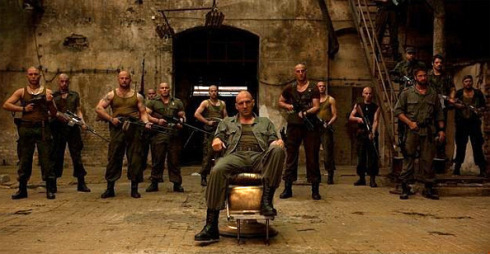
I haven't mentioned Coriolanus, Ralph Fiennes' directorial debut, and his chance to play the Roman emperor onscreen, having already played him onstage, but if you like your Shakespeare in a modern setting – in this case, an unnamed war-torn Balkan country, albeit filmed in Belgrade so you get the general idea – it's convincingly done. And Fiennes makes a pretty powerful Coriolanus, with his shaved head, dog tags and khaki vest. Less impressive is Gerard Butler as his nemesis, who mangles some of his lines, but his is not the worst crime; for me, an overcooked Vanessa Redgrave had the effect of smothering all around her whenever she was onscreen. Also, there is too much reliance of faked TV news footage to explain the action and to underline the modern re-staging, and I found Jon Snow delivering Iambic pentameter to be unintentionally comic (unless it was intentionally comic, in which case I withdraw my criticism). But I really liked Brian Cox and James Nesbitt, and I managed to follow the story, which is not always easy with what are, let us not be coy, very old plays. The story is a bit repetitive, but that's the bloke who wrote the play's fault, surely?
I always needed a bit of visual help when studying Shakespeare at school, and will always be grateful to the BBC Macbeth with Ian McKellen, and the BBC Othello with Anthony Hopkins and Bob Hoskins. I'm sure this will help students of Coriolanus. And hey, it's another of the 50 films Jessica Chastain made last year. She's the female Ryan Gosling.
Apologies for the late running of these film reviews. I am hard at work writing the second series of Mr Blue Sky and that must take priority, as you can imagine. (Deadline for all six episodes: end of February.)








January 26, 2012
But who are the other two people?

The full coverage of last week's Radio Times Covers Party is now online at the RT website, and in this week's magazine. But they have kindly allowed me to publish this exclusive session here. About two thirds of the way through the well-oiled occasion, I asked if I might have my photo taken in the pop-up studio in the lobby of Claridge's. Strict picture editor Olivia quite rightly declined my request and said that I could only have my snap taken with the prop RT cover if I delivered a famous person to be photographed with. Duly challenged, within moments I had delivered Vic Reeves and Vicky McClure, legends both, who happened to be deep in conversation at the time, which I cheerily interrupted. They sportingly allowed me to invade their "cover."
You know me: I live to stand next to famous people. But this was a particularly charming constellation, I thought.
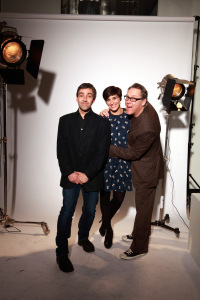
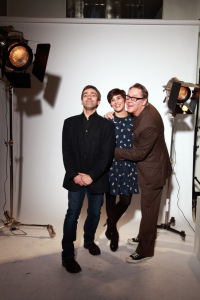
By the way, you thought the comments left on the Guardian website were bitchy and negative. Beneath the coverage on the Radio Times site, someone posting under their full name (to their credit), wrote: "And we're meant to be impressed by this self-congratulatory event, how … ?"
Ouch.








January 23, 2012
Hoover-building
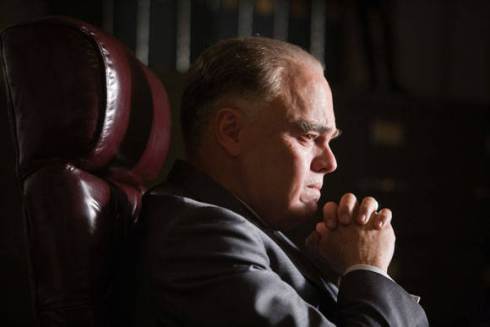
In any other year, I suspect Clint Eastwood's J. Edgar would be all over the award nominations, with Leonardo DiCaprio a strong contender for best actor. As it is, it seems to have been barged out of the way, outclassed by the competition. (The film notched up one nomination at the Globes, for Leo, and has two at the imminent Screen Actors' Guild awards, one for Leo – where he finds himself up against the expected Clooney, Pitt and Dujardin – the other for his excellent co-star Armie Hammer – who will presumably fall to Plummer or Branagh.) There's no need for us to cry into our hankies. Clint Eastwood only has to make a film these days to earn an automatic place in the shortlists, and that can be tiresome and predictable. But the reviews for J. Edgar have also been lukewarm. Peter Bradshaw all but took it apart in the Guardian.
I went to see it yesterday with expectations lowered. And it turned out to be rather good. I have a keen interest in 20th century American history, and in US politics in general, and enjoyed seeing 40 years replayed, albeit rather more selectively and thus in more detail, than the comparable time frame covered by The Iron Lady. J. Edgar Hoover ran the Federal Bureau of Investigation from its inception at the Justice Dept in 1935 to his death in 1972, although the film, written by Dustin Lance Black, begins in 1919, when the up-and-coming 24-year-old Hoover was put in charge of a new bureau charged with weeding out radicals. This became his calling.
Because most of his private files were destroyed before the Nixon administration could seize them on his death, much of his story remains speculative, especially the infamous bit about him wearing women's clothing – something of an own goal for a man whose reputation was built upon the old-fashioned Republican tenets of God-fearing moralism and family values. He never married, and lived with his mother (here played by Judi Dench, whose American accent occasionally wobbles but whose presence is suitably dominant), and Black's screenplay, while never lurid, makes Hoover out to be quite the repressed "radical and subversive" himself.
His previous film was the excellent Milk, and there are similarities here, in that both are biopics of sexually unconventional political figures – albeit one out, the other closeted – told using the device of the character dictating the story of his own life for posterity. Harvey Milk is seen relaying his memoir into a cassette recorder as if certain of his own looming assassination; Hoover dictates, and embroiders, his to a series of agents at a typewriter, driven to do so by the ill-health of old age. It's a well-worn framing device, and means both stories are told in flashback, but it helps to arrange the material in a clear and chronological fashion, which is particularly useful if you're not familiar with the facts. (I knew little about Milk; I know plenty about Hoover.)
What seems to bother a number of critics is the way some aspects of Hoover's career and character are foregrounded, while others are skipped over. This is built into any biopic lasting shorter than, say, eight hours. The Iron Lady got round it by providing only the most shallow soundbites to ratchet up the career highlights. J. Edgar does so by making the Lindbergh kidnapping and eventual, forensic-driven outcome its central drama, a turning point in Federal law, and in the reputation of the FBI, and thus of Hoover. I found it persuasively staged, and if it meant that less screen time could be devoted to, say, his witch hunts against the likes of Sean Seberg or Charlie Chaplin, or his failure to address the Mafia, well, something had to go. (There is a single scene with Bobby Kennedy, which touches on organised crime, one of the Attorney General's pet subjects, but its central purpose is really to show that Hoover had to blackmail to keep his job with more moderate administrations.)
There's no shying away from the fact that Hoover was a poisonous, bigoted hypocrite, but I found Black's treatment of his career-long platonic love affair with his number two, the energetic and loyal Clyde Tolson (Armie Hammer, last seen playing both Winklevoss twins in The Social Network, and very good indeed here) actually rather sweet. Hoover is a mess of contradictions and repressed feelings, and would rather physically fight Tolson over challenges to his heterosexuality than kiss him, but as the two men age – call the makeup department! – their dotage brings with it a dignified acceptance that they are soul-mates even if they cannot be lovers. In the later scene where DiCaprio takes the top off Hammer's boiled egg – the latter debilitated by a stroke – you are touched by the carefully controlled affection Hoover is prepared to exhibit in private.
This is not the same, I don't think, as "humanising" Thatcher by showing her all forgetful and lonely in The Iron Lady. For a start, Hoover's been dead since 1972, and his brand of red-hunting paranoia has been broadly replaced, while sexual honesty even in America has moved in apace (not least thanks to activists like Harvey Milk in the 1970s, and like Dustin Lance Black in the noughties and beyond). Because Clint Eastwood is a known Republican, it's somewhat surprising that he would wish to make a biopic about a repressed homosexual who is shown, at one point, sniggering over the wording of a letter from Eleanor Roosevelt to an apparent lesbian lover, but Eastwood has actually made a film about old age, too. When DiCaprio and Hammer are trussed up in half a ton of latex for the Little Britain years – DiCaprio comes off better as an old geezer than Hammer – you really sense that the 80-year-old Eastwood identifies with them. There is a single kiss planted on Tolson's head by Hoover that almost put a tear in my eye. This does not mean I forgive the man for hounding Martin Luther King and holding successive Presidents to ransom by foul means.
One of the main reasons I have stopped going to America since Bush is that I do not wish to add my fingerprints to the files of the Federal Bureau of Investigation. Hoover set that in motion. His legacy is substantial. Anchored by an excellent, well-modulated turn by the Peter Pan of Hollywood, who finally carries some physical weight here, J. Edgar does a decent, if unshowy job of putting Hoover's place in political history into some kind of personal perspective. And by kind of blaming him on his mother. LGBT activists worried that Eastwood might "de-gay" Black's story, but he hasn't, any more than he "de-Japanesed" Letters From Iwo Jima. Maybe he's just getting a bit liberal in his old age. Something that never happened to Thatcher.
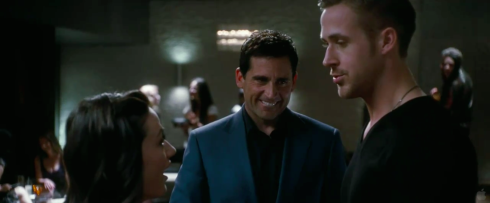
More soul-mates: a quick mention for Crazy, Stupid, Love, which I caught on DVD, and completes the set of Ryan Gosling's Films of 2011, along with Drive, Blue Valentine and The Ides Of March. I thought I'd like it the least, but I didn't, it's actually my third favourite of those four films. This is a romantic comedy with a truly offputting title that conceals a significant dose of actual drama from writers/directors Glenn Ficarra and John Requa, whose first film behind the megaphone was gay true story I Love You Phillip Morris, which in truly professional style, I've only seen bits of, on telly, so cannot comment upon in an meaningful way.
The man in Sight & Sound accused the plot of Crazy, Stupid, Love of being "mechanical", and it is, in that it seems to tell a number of random stories about love – the crazy kind and the stupid kind – which turn out to be interlinked in clever ways. But two of these links were complete surprises to me. I didn't see either of them coming. So something must be going right. Gosling is the bar shark, whose pickup rate with available women is around 100%. But the star of the film is recent divorcee Steve Carell, whom Gosling takes under his wing and retrains in the art of seduction. Julianne Moore, Emma Stone and Marisa Tomei round out the high-class cast, but it's good to see Carell dialling down the gurning a bit, and he shows signs of being a decent serious actor here, among all the coincidences and occasional broad, comedic strokes. There's a scene where one character makes a speech at a public event which was one conventional, forced set-up too many, and some of the minor characters – particularly Emma Stone's dopey boyfriend – were too much like cutouts compared to the warm-blooded leads, but overall, this was a well-written, offbeat drama.
There's a running gag in J. Edgar – yes, a gag – about Hoover's paranoia not about Communist plots, but about his waistline. Two characters refer to his extra bulk as "solid weight." You expect a historical biopic to carry solid weight, but less so a romantic comedy with a terrible title. Crazy, Stupid, Love bucks that expectation. Give it a spin.

January 21, 2012
The Fall
Yes, this week's Telly Addict returns indulgently to the subject of Sherlock on BBC1, specifically its brain-teasing ending (don't worry, you'll get no theories from me, just supplementary praise and at least one clip of Molly), plus Stargazing Live on BBC2, the Golden Globes on E!, and a quick look at Nick Hewer on Countdown on C4. I hope you like my shirt.

Andrew Collins's Blog
- Andrew Collins's profile
- 8 followers


